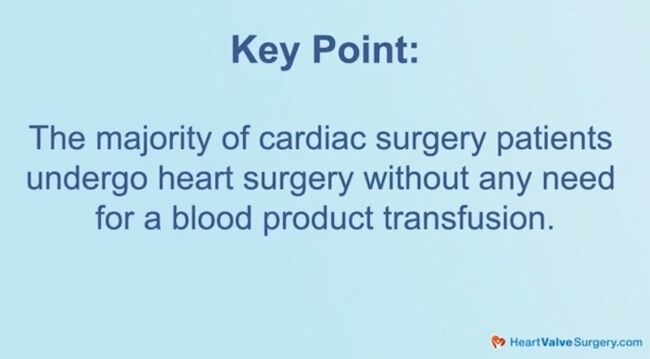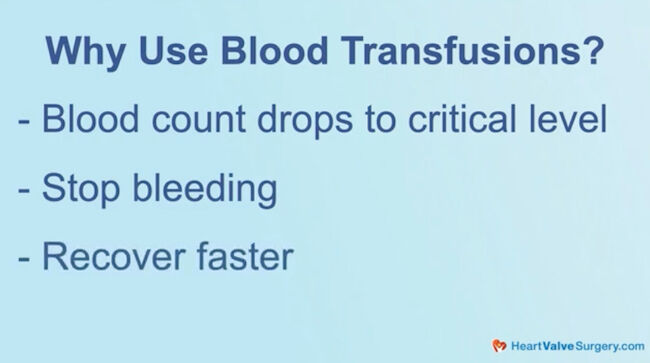Blood Transfusions: What Should Heart Surgery Patients Know?
Written By: Allison DeMajistre, BSN, RN, CCRN
Medical Expert: Edward Soltesz, MD, Cardiac Surgeon, Cleveland Clinic, Cleveland, Ohio
Reviewed By: Adam Pick, Patient Advocate, Author & Website Founder
Published: November 3, 2025
The advances in heart valve surgery have made it a safe procedure that can give patients a longer and better quality of life. However, unexpected complications can happen, even in the most straightforward cases, leaving patients and their families confused and frustrated. Understanding the potential for complications and how surgeons handle them is vital to preparing for and recovering from heart valve surgery.
Sandy, a member of our patient community, recently sent us a question about a complication she experienced with her surgery. She asked, “I had mitral valve repair with numerous complications. I needed a blood transfusion. When is a blood transfusion advised? What are the symptoms? How often do they happen? What are the pros and cons? And what about blood banking before surgery?” I was thrilled to have Dr. Edward Soltesz, join us to answer Sandy’s question. Dr. Soltesz is a leading cardiac surgeon at the Cleveland Clinic in Cleveland, Ohio.
About Blood Transfusions and Heart Surgery
Here are key insights shared by Dr. Soltesz:
- Most patients having cardiac surgery won’t need a blood transfusion. “Dr. Soltesz said, “Sandy, I’m sorry you had the complications you did. You obviously had a major surgery, but I’m hoping you’re doing well now. You raised an interesting question, though, and that is blood product utilization. The majority of cardiac surgery patients undergo heart surgery without any need for a blood product transfusion. So, that’s first and foremost, and I think it’s important to recognize for all patients.”

- Why would a patient need a blood transfusion? “The need for a blood product transfusion can be for several reasons,” said Dr. Soltesz. “If your blood count drops to a critical level due to possibly bleeding during surgery, the team often will administer a blood product.” Dr. Soltesz explained that they often give either blood or coagulation factors to help stop the bleeding in certain situations. The goal is to allow you to recover faster through your ICU and recovery phase- even at home.
- There are positive and negative aspects of receiving blood transfusions. Dr. Soltesz said, “The issue with blood product utilization is that it comes with a risk.” He explained that they know from 25 years of studies, looking extensively at blood product utilization in surgery, that when a patient receives a blood product transfusion, some positives and negatives accompany it. “Positives relate to the here and now, the immediate phase and getting them through the ICU faster, back home and recovering faster. On the flip side, we know that in certain situations, there may be a penalty in the long term. We know that blood product transfusion can impact long-term survival. And that is for all types of surgeries, not only cardiac surgery, and understanding is critical.”

- How can the need for blood transfusions be prevented? “Preventing blood product transfusion starts before surgery,” said Dr. Soltesz. “We at the Cleveland Clinic have just started a new center called the Center for Bloodless Surgery. It is the first of its kind where we bring experts from all disciplines together preoperatively, including hematology, anesthesia, surgery, and critical care, for patients with low blood counts. We ideally optimize those patients with a number of both medications and blood banking options. There are many options available, but I think it is a very important question because most patients don’t need blood and don’t receive blood during a standard open heart surgery. If they do, often it is because their blood count has fallen too low, and they need support. Identifying patients needing that preoperatively and mitigating that risk up front is key to success.”
Thanks to Dr. Soltesz and Cleveland Clinic!
On behalf of Sandy and all the patients in our community, thank you, Dr. Edward Soltesz, for everything you and your team are doing at Cleveland Clinic in Cleveland, Ohio!
Related Links:
- Edward Soltesz, MD: Heart Surgeon in Cleveland, Ohio
- Surgeon Roundtable: Complex and High-Risk Heart Valve Surgery
Keep on tickin,
Adam
P.S. For the deaf and hard-of-hearing members of our patient community, we have provided a written transcript of our interview with Dr. Soltesz below.
Video Transcript:
Adam Pick: Hi everybody! It’s Adam with HeartValveSurgery.com and we’re in Los Angeles, California at the Society of Thoracic Surgeons Conference. I’m thrilled to be joined by Dr. Edward Soltesz, who is a leading cardiac surgeon at Cleveland Clinic in Cleveland, Ohio. Dr. Soltesz, we’ve known each other for a long time. It’s great to see you again.
Dr. Edward Soltesz: Nice to see you, Adam.
Adam Pick: We’re here at STS and we’re answering patient questions that are coming in from all over the world. This one comes in from Sandy and she asks, “I had mitral valve repair with numerous complications. I needed a blood transfusion. When is a blood transfusion advised? What are the symptoms? How often do they happen? What are the pros and cons? And what about blood banking before surgery?”
Dr. Edward Soltesz: Sandy asks a very interesting question. Sandy, I’m sorry you had the complications that you had. You obviously had a major heart surgery. But, I’m hoping you’re doing well now.
You raised an interesting question, though, and that is blood product utilization. Majority of cardiac surgery patients undergo heart surgery without any need for a blood product transfusion. So that’s first and foremost. I think it is important to recognize for all patients.
The need for a blood product transfusion can be for a number of reasons. If your blood count due to possibly bleeding during surgery drops to a critical level, the team often will administer a blood product, possibly either blood or coagulation factors to help stop the bleeding in certain situations with the goal to be able to allow you to recover faster through your ICU and your recovery phase — even at home.
The issue of course with blood product utilization is that it comes with a risk. We know from studies – now out 25 years – where we’ve extensively studied blood product utilization in surgery, that whenever a patient does receive a blood product transfusion, there’s positives and negatives about it.
Positives, of course, relate to the here and now, to the immediate phase, being able to get them through the ICU faster, getting the patients out, back home and recovering faster.
But, on the flip side, we know that there is sometimes, in certain situations, There is a penalty in the long term. We know that blood product transfusion long term can impact long term survival. And that is for all types of surgeries, not only cardiac surgery. So, understanding that, I think, is critical.
You bring up a point about what can be done. Well, I think most importantly, preventing blood product transfusion starts before surgery.
We at the Cleveland Clinic actually have just started a new center, the Center for Bloodless Surgery. This is the first of its kind where we bring experts from all disciplines together, from hematology, from anesthesia, from surgery, from critical care, all together pre-operatively in patients who have low blood counts.
We ideally optimize those patients with a number of both medications as well as potentially blood banking options as well. So, there are many options available but I do think this is a very important question because most patients don’t need blood and don’t receive blood during a standard open heart surgery.
If you do, oftentimes, it’s because your blood count has fallen too low and you need support. But of course, ideally, identifying patients who potentially will need that preoperatively and mitigating that risk up front is key to success.
Adam Pick: Well, Dr. Soltesz, on behalf of Sandy and all the patients at HeartValveSurgery.com, patients all over the world, thanks to the work that you and your team are doing there at Cleveland Clinic in Ohio. Thanks so much for being with me today.
Dr. Edward Soltesz: Thank you, Adam. Thank you very much.





